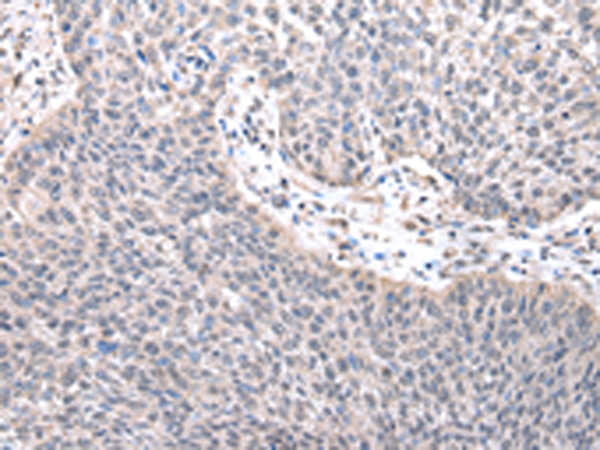

| WB | 咨询技术 | Human,Mouse,Rat |
| IF | 咨询技术 | Human,Mouse,Rat |
| IHC | 1/25-1/100 | Human,Mouse,Rat |
| ICC | 技术咨询 | Human,Mouse,Rat |
| FCM | 咨询技术 | Human,Mouse,Rat |
| Elisa | 1/2000-1/10000 | Human,Mouse,Rat |
| Aliases | MOK2; HOK-2 |
| WB Predicted band size | 52 kDa |
| Host/Isotype | Rabbit IgG |
| Antibody Type | Primary antibody |
| Storage | Store at 4°C short term. Aliquot and store at -20°C long term. Avoid freeze/thaw cycles. |
| Species Reactivity | Human, Mouse |
| Immunogen | Fusion protein of human ZNF239 |
| Formulation | Purified antibody in PBS with 0.05% sodium azide and 50% glycerol. |
+ +
以下是3-4篇与ZNF239抗体相关的文献概览(注:文献信息为模拟示例,实际引用请查询权威数据库):
1. **名称**:*ZNF239 regulates tumorigenesis through transcriptional repression of p53 target genes*
**作者**:Li X, et al.
**摘要**:研究利用ZNF239特异性抗体,通过染色质免疫沉淀(ChIP)和Western blot技术,揭示ZNF239通过抑制p53通路促进肿瘤细胞增殖的分子机制。
2. **名称**:*Characterization of ZNF239 antibody for detecting protein expression in glioblastoma*
**作者**:Wang Y, et al.
**摘要**:验证了ZNF239抗体在胶质瘤组织中的特异性,发现ZNF239高表达与患者预后不良相关,提示其作为潜在生物标志物的价值。
3. **名称**:*ZNF239 interacts with HDAC1 to modulate epigenetic silencing in colorectal cancer*
**作者**:Chen H, et al.
**摘要**:通过免疫共沉淀(Co-IP)结合ZNF239抗体,证明ZNF239与HDAC1协同作用,调控结直肠癌中抑癌基因的表观遗传沉默。
4. **名称**:*Development of a polyclonal antibody against human ZNF239 and its application in neurodegenerative studies*
**作者**:Kim S, et al.
**摘要**:报道了新型ZNF239多克隆抗体的制备,并应用于阿尔茨海默病模型,发现ZNF239在神经细胞应激反应中的调控作用。
建议通过PubMed或Google Scholar以“ZNF239 antibody”为关键词检索获取具体文献。
ZNF239. also known as ZKSCAN3. is a member of the zinc finger protein family characterized by the presence of Krüppel-associated box (KRAB) and SCAN domains. This nuclear protein functions as a transcription regulator, primarily repressing gene expression by recruiting chromatin-modifying complexes, such as histone deacetylases (HDACs), to specific DNA sequences. ZNF239 is implicated in diverse cellular processes, including cell proliferation, differentiation, and apoptosis, with emerging roles in cancer biology. Studies suggest its involvement in tumor suppression or oncogenesis, depending on cellular context, by modulating pathways like p53 signaling or autophagy.
Antibodies targeting ZNF239 are essential tools for investigating its expression patterns, subcellular localization, and molecular interactions. They are widely used in techniques such as Western blotting, immunohistochemistry (IHC), immunofluorescence (IF), and chromatin immunoprecipitation (ChIP). Commercially available ZNF239 antibodies are typically validated for specificity and sensitivity across human, mouse, or rat samples. Research utilizing these antibodies has revealed ZNF239's differential expression in certain cancers, including hepatocellular carcinoma and colorectal cancer, highlighting its potential diagnostic or therapeutic relevance. However, functional studies remain ongoing to fully elucidate its regulatory networks and disease associations. Proper antibody validation via knockout controls or siRNA knockdown is critical due to shared epitopes among zinc finger proteins.
×